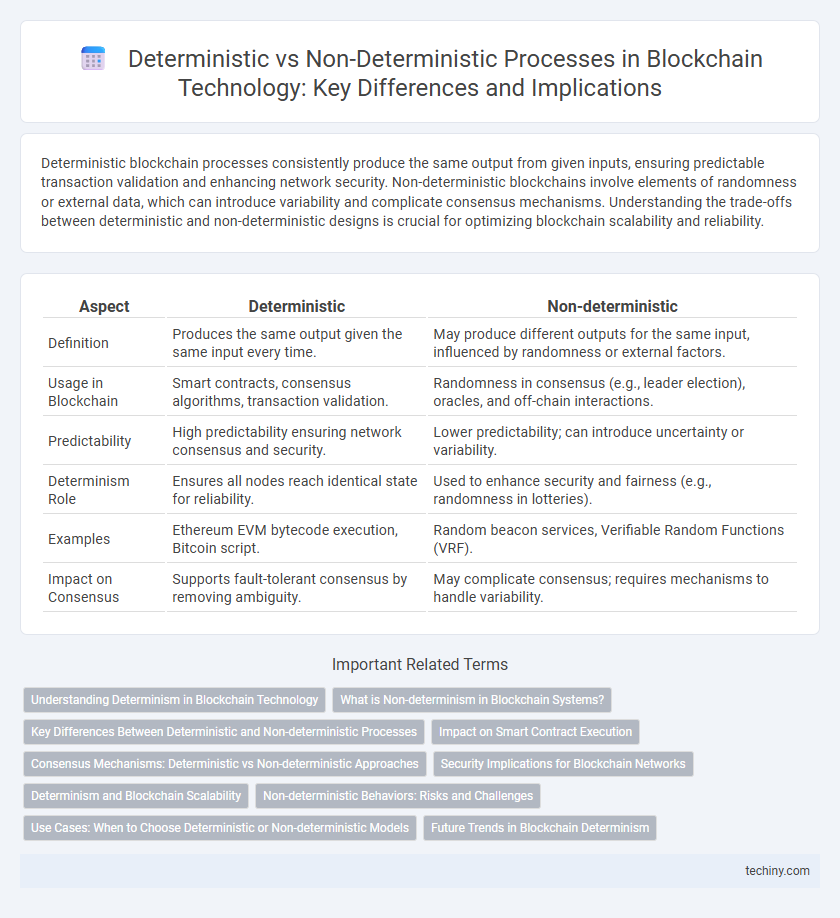Deterministic blockchain processes consistently produce the same output from given inputs, ensuring predictable transaction validation and enhancing network security. Non-deterministic blockchains involve elements of randomness or external data, which can introduce variability and complicate consensus mechanisms. Understanding the trade-offs between deterministic and non-deterministic designs is crucial for optimizing blockchain scalability and reliability.
Table of Comparison
| Aspect | Deterministic | Non-deterministic |
|---|---|---|
| Definition | Produces the same output given the same input every time. | May produce different outputs for the same input, influenced by randomness or external factors. |
| Usage in Blockchain | Smart contracts, consensus algorithms, transaction validation. | Randomness in consensus (e.g., leader election), oracles, and off-chain interactions. |
| Predictability | High predictability ensuring network consensus and security. | Lower predictability; can introduce uncertainty or variability. |
| Determinism Role | Ensures all nodes reach identical state for reliability. | Used to enhance security and fairness (e.g., randomness in lotteries). |
| Examples | Ethereum EVM bytecode execution, Bitcoin script. | Random beacon services, Verifiable Random Functions (VRF). |
| Impact on Consensus | Supports fault-tolerant consensus by removing ambiguity. | May complicate consensus; requires mechanisms to handle variability. |
Understanding Determinism in Blockchain Technology
Determinism in blockchain technology ensures that all nodes validate transactions and execute smart contracts identically, producing consistent and predictable outcomes critical for consensus. Non-deterministic processes introduce variability that can cause discrepancies in the ledger, undermining trust and security. Understanding this distinction clarifies why deterministic algorithms are essential for maintaining the integrity and reliability of decentralized systems.
What is Non-determinism in Blockchain Systems?
Non-determinism in blockchain systems refers to situations where transaction outcomes or smart contract executions cannot be predicted with certainty before they occur, often due to external inputs or asynchronous events. This unpredictability challenges consensus mechanisms, as nodes may process the same transaction differently, leading to potential inconsistencies or forks. Managing non-determinism requires techniques like oracles or on-chain randomness to ensure reliable and verifiable blockchain operations.
Key Differences Between Deterministic and Non-deterministic Processes
Deterministic processes in blockchain execute transactions with predictable outcomes based on predefined rules, ensuring consistency across all nodes and enabling reliable smart contract execution. Non-deterministic processes involve elements of randomness or external inputs, leading to variable results that can challenge consensus mechanisms and complicate transaction validation. Understanding these key differences is crucial for optimizing blockchain protocols, as deterministic models enhance security and verification, while non-deterministic models may offer flexibility at the cost of increased complexity.
Impact on Smart Contract Execution
Deterministic smart contracts guarantee the same output for a given input across all nodes, ensuring consensus and preventing forks in blockchain networks. Non-deterministic contracts introduce variability that can lead to execution discrepancies, increasing the risk of conflicts and security vulnerabilities. Ensuring deterministic execution is critical for maintaining trust, reliability, and the integrity of decentralized applications (dApps) on blockchain platforms.
Consensus Mechanisms: Deterministic vs Non-deterministic Approaches
Consensus mechanisms in blockchain can be classified into deterministic and non-deterministic approaches based on their predictability and outcome assurance. Deterministic consensus algorithms, such as Practical Byzantine Fault Tolerance (PBFT), guarantee finality where nodes reach a single, irrevocable decision, enhancing security and consistency in permissioned networks. Non-deterministic methods like Proof of Work (PoW) rely on probabilistic outcomes, where consensus is eventually achieved through competing miners, ensuring decentralization and resistance to censorship despite temporary forks.
Security Implications for Blockchain Networks
Deterministic blockchain protocols enhance security by ensuring that all nodes reach consensus with predictable and verifiable outcomes, reducing the risk of forks and double-spending attacks. Non-deterministic protocols introduce variability in transaction validation, which can increase vulnerability to manipulation and inconsistencies in state replication. Secure blockchain networks prioritize deterministic mechanisms to maintain data integrity and consensus reliability across distributed ledger systems.
Determinism and Blockchain Scalability
Determinism in blockchain ensures that all nodes reach consensus by producing the same output for a given input, critical for reliable smart contract execution and network security. This predictability enhances scalability by enabling efficient state replication and reducing computational overhead during transaction validation. Non-deterministic processes introduce variability that complicates consensus and hampers performance, limiting blockchain scalability.
Non-deterministic Behaviors: Risks and Challenges
Non-deterministic behaviors in blockchain systems pose significant risks by introducing unpredictability into transaction processing and consensus mechanisms, potentially leading to forks and inconsistencies across distributed ledgers. These challenges complicate smart contract executions, where outcomes may vary across nodes due to factors like external data feeds or asynchronous events. Managing such unpredictability requires robust fault tolerance and consensus algorithms to maintain blockchain integrity and security.
Use Cases: When to Choose Deterministic or Non-deterministic Models
Deterministic blockchain models are ideal for applications requiring predictable outputs, such as financial transactions, supply chain verification, and identity management, where consistency and auditability are crucial. Non-deterministic models suit use cases involving randomness or uncertainty, like decentralized gaming, oracles, and lottery systems, where outcomes depend on probabilistic events. Choosing between deterministic and non-deterministic approaches depends on the need for transparency, reproducibility, and the nature of the problem domain.
Future Trends in Blockchain Determinism
Future trends in blockchain determinism emphasize enhanced predictability and reliability in smart contract execution, driven by deterministic consensus algorithms like Proof of Stake and Byzantine Fault Tolerance. Advances in formal verification tools and deterministic off-chain computations aim to reduce uncertainty and increase scalability in decentralized applications. Integration of deterministic models with emerging technologies such as quantum-resistant cryptography will further secure blockchain networks against future threats.
Deterministic vs Non-deterministic Infographic

 techiny.com
techiny.com